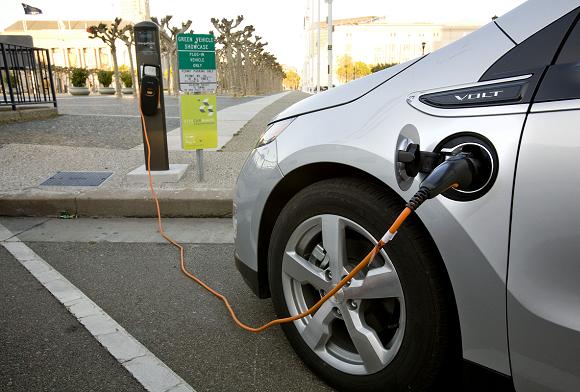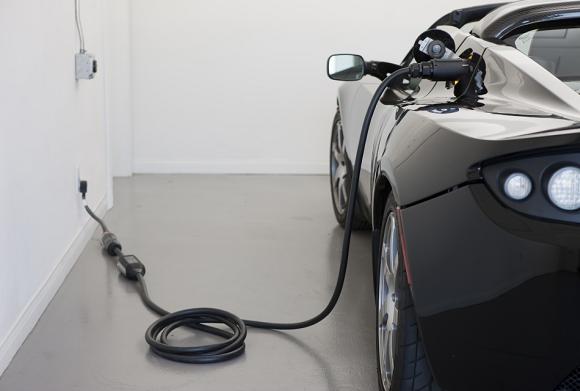Original URL: https://www.theregister.com/2010/09/02/tesla_range_anxiety/
General Motors bitchslaps Tesla with Range Anxiety™
Fixed grins at cheeks-aflame 'leccycar firm
Posted in Science, 2nd September 2010 12:11 GMT
As US motor mammoth GM gears up for the launch of its plug-in hybrid Chevrolet Volt, it has applied to trademark the term "range anxiety" - meaning the fear suffered by battery-car owners regarding their ability to get home again after a given journey. Upstart battery car maker Tesla Motors has issued a panicky and unconvincing statement in response.

If you can't find one of these, just go to a petrol station.
The GM trademark application for "range anxiety" was noted on Tuesday by car-crazy news site Jalopnik, and has been widely picked up in the mainstream media.
"It's something we call ‘range anxiety,' and it's real," a GM spokesman told Jalopnik. "That's something we need to be very aware of when we market [the Volt]. We're going to position this as a car first and electric second... people do not want to be stranded on the way home from work."
The Volt, as a plug-in hybrid, is expected to be able to make short trips - for instance the average American's daily commute - purely on battery power, and recharge from the mains in possibly-righteous-one-day-when-grid-leccy-is-green style. But it also has a normal combustion engine, which will kick in once the battery goes flat.
GM feels that "range anxiety" is a major reason why its original EV-1 battery car of the 1990s failed.
”We’ve been here before,” says GM marketing honcho Joel Ewanick. “We have first-hand experience with what the issues are.”
You don't just need a charging point with an EV - you probably need a hotel, too
In short, the difficulty with an all-electric battery car is that there is little certainty of actually being able to complete any journey even close to the vehicle's rated range, as battery endurance is highly variable - and manufacturers can't publicise the worst-case (or even perhaps the likely-case) figures. If they did, nobody would ever buy their products.

On the other hand if this is the situation ...
Running low on fuel is a trivial matter in an internal-combustion vehicle or a plug-in Volt, as one simply fills up and drives on. This is not an option for today's battery cars, even the most advanced. The Tesla Roadster is on the cutting edge, but even in the unlikely event of being able to find a specialised high-power outlet it will still require hours before it is anything like full.
Much more likely, a stranded Roadster driver will be forced to plug into an ordinary outlet (even that may be difficult to arrange). A Roadster takes days, not hours, to fully charge from a normal US wall socket (don't drive it on overnight visits to friends too far away). This devastating account by a Car & Driver journo of his recent failed attempt to make a round trip of 181 miles by Roadster (rated range 244 miles) shows that "range anxiety" is definitely a big deal for a prospective battery car purchaser, and that GM have probably put their finger on a very sore point for Tesla Motors.
Funnily enough, a short statement landed in journalists' inboxes yesterday, as the "range anxiety" story began to get some play. This is what Tesla's top mouthpiece Ricardo Reyes had to say:
By all means, GM can have “range anxiety.” To Roadster owners, the term is as irrelevant as “gas stop” or “smog check.” We are, however, looking into trademarking “Tesla grin.”
The term "gas stop" is indeed irrelevant to Roadster drivers ("desperate charging-point search followed by lengthy unplanned hotel stay" is perhaps the nearest equivalent, as Car & Driver's account makes clear). But "gas stop" isn't going to be an irrelevant term for Volt drivers: and Tesla might come to wish that wasn't true.
'Tesla' = 'Fixed', when it comes to grins
Indeed, Tesla have more or less admitted that the issue of "range anxiety" exists, as the company has previously said that it will offer versions of its forthcoming Model S with internal combustion generators supplementing the batteries.

... you're going to need one of these.
The "Tesla grin" seems more than a little strained on this one, then.
All that said, battery-car fanciers needn't give up yet. The prospect exists of cars using lithium-titanate batteries reaching the market at some point. These still can't charge up fast from any normal power outlet, but given industrial three-phase juice they can be up to 80 per cent in under three minutes.
Unlike a Roadster, a Lightning li-ti supercar could one day pull onto a forecourt, charge in a few minutes, and drive off. As a result, garage owners might actually put high-power outlets on their forecourts, happy in the knowledge that a reasonable number of paying customers might be able to use them in a day.
But the Lightning seems to be retreating further and further into the future. Two years ago it was one year off: as of now, deliveries are expected in two years.
Meanwhile, reputable Swiss boffins have lately pointed out that in fact a VW Golf powered by one of the new, super-low-emission injected turbodiesels is responsible for less carbon emissions over its lifespan than one with a li-ion battery running on typical grid power.
It may be true that ultimately electric transport and battery cars are the way forward: after all, quite apart from anything else, the oil and gas will one day run out (if perhaps not as soon as some are predicting). And Western consumers might like to stop buying oil and gas from unpleasant regimes sooner than that, regardless of the fact that ecodiesels mean less carbon emissions than battery EVs.
But right now and in the near future, that "Tesla grin" is definitely looking rather fixed. ®